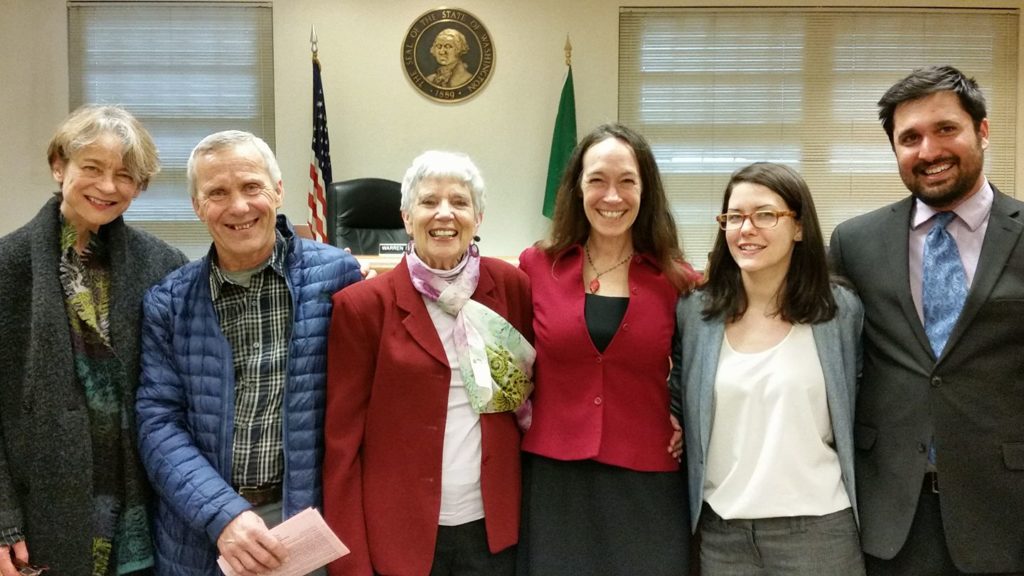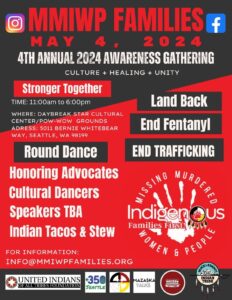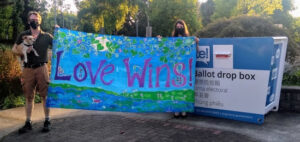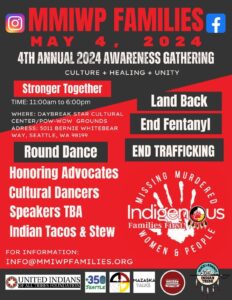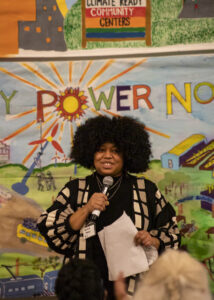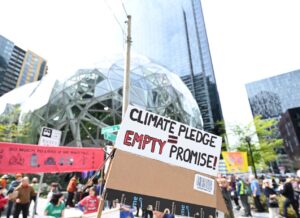‘I am an ordinary person. I am not a radical. I’ve never broken the law, and I had to think long and hard about that.’
— Susan Monson, retired 6th grade teacher testifying at her trial for criminal trespass.

Susan Monson, Randy Meier, Clara Cleve, Joelle Robinson, Cait Taylor, Ahmed Gaya
Last week, six people were tried for misdemeanor criminal trespass in the second degree in Skagit County District Court, Mt. Vernon, WA. Their “crime” was to have taken part in an oil train blockade as part of the Break Free mobilization of May 2016.
As part of Break Free, there were actions in 31 countries on 6 continents: in Newcastle, Australia, the largest coal terminal in the world was shut down, as were the largest coal mines in both the UK and Germany, while in Washington, over 2,000 people traveled to a Northwest refinery hub to call for a just transition away from fossil fuels.
As part of the mobilization—which included a three-day climate conference and a 2000-person Native-led march—over 300 people pitched tents, built structures and slept on the train tracks that led to the refineries. As a result of the action, both refineries—which combined are responsible for 47% of the gas consumed in the Northwest—cancelled all oil trains that weekend.
The blockade lasted 36 hours, from Friday evening until Sunday morning. When the police swept in at 5am on Sunday morning, 52 people chose to remain on the tracks and be arrested fortrespassing on BNSF property. Their trials are happening nearly weekly from now through May.
Break Free was a planned act of civil disobedience. Why? The Break Free PNW website gives the following answer:
In his Letter from Birmingham City Jail, Martin Luther King, Jr., wrote: “We who engage in nonviolent direct action are not the creators of tension. We merely bring to the surface hidden tension that is already alive”. In this case, that hidden tension is the fact that the survival of a stable planet depends on our not going past 1.5°C of warming; despite widespread acknowledgement of this truth, at the moment, we’re on track for over 3°C, and there are no existing political plans that address this disparity. Many of us here in the NW risk far less than MLK did when we risk arrest–and far less than indigenous activists defending their lands elsewhere: it’s important those of us with privilege use that privilege to impact the policies that are taking such a terrible toll on the whole world.
At the first day of trial, the state called its witnesses and police officers took to the stand to testify. “I was impressed by the organization of the camp. It was calm and peaceful,” said Officer Haglan. It was a sentiment repeated by every officer: They were polite, they were courteous, they were well-organized and surprisingly disciplined.
On the second day of trial, the defendants took to the stand. Many of them spoke of their engagement with the political system—of educational efforts, voter mobilization drives, fundraising campaigns, letter writing, picketing and petitioning they had participated in. But despite all this, they said, the urgency of the climate crisis has only increased.
One defendant, Ahmed Gaya, spoke of his family in Karachi, Pakistan, where nearly 1200 people died in a single heatwave in 2015. He also spoke of the fact that 35-40 million Pakistanis are expected to be made refugees in coming decades, as a direct result of human-caused climate change.
Closer to home, defendant Joelle Robinson spoke of fourteen years of working on climate issues, and of growing up in Whatcom County with a father who was a fisherman, a logger and a volunteer firefighter. “I’ve been very concerned about the increase in the number of catastrophic wildfires in Washington state,” she said, her voice wavering with emotion, as she spoke of recent Washington wildfires that killed three firefighters and left another with life-threatening injuries.
“If there was one thought going through your head after as you headed to the tracks what was that?” asked her lawyer. “I felt I needed to be able to look my nieces and nephews in the eyes and tell them that, honestly, I had done everything I could,” Joelle said.
In his closing statement, the defendants’ lawyer, Ralph Hurvitz, gave a lengthy speech about the history of civil disobedience. He referenced Susan B. Anthony, who broke the law prohibiting women the right to vote by casting a vote in the 1872 Presidential election. He spoke of the women led by Alice Paul, who for two years picketed outside of the White House calling for the right to vote, and of the hundreds who were arrested, as part of these demonstrations. “These women changed the conversation with their acts of civil disobedience,” he said, drawing a clear link between their actions and the passing of the 19th Amendment to the United States constitution.
He spoke also of Rosa Parks’ refusal to give up her seat, of the Greensboro four who sat at the lunch counter and were arrested for criminal trespass, and of the priests Daniel and Philip Berrigan, who destroyed 368 government draft files in protest of the Vietnam War.
These acts were essential, he said, because they changed the political conversation, and changed what was possible. “I will go out on a limb,” he finished by saying, “And tell you that this country would be very different than it is if it were not for people throughout history who have stepped forward, been brave and committed acts of civil disobedience.”
Shortly afterwards, the jury found all six defendants guilty of criminal trespass and sentenced each to pay a $250 fine and carry out eight hours of community service.
Given the urgency of the climate crisis, the defendants said, they felt it was a small price to pay.
Packing up their things, the defendants were preparing to leave when one of the six jurors came back in to the courtroom. They paused and looked at her.
“I have just come to say thank you,” she said. “I am so grateful for what you’ve done.”



